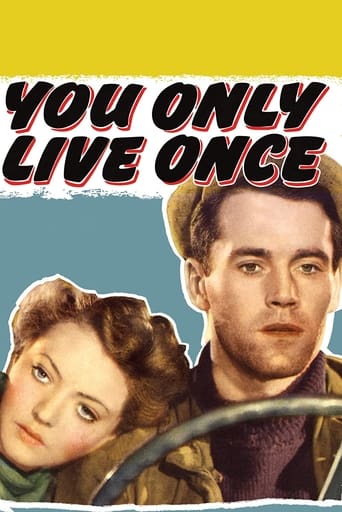Patryk Czekaj
An ambitious yet deeply depressing picture directed by Fritz Lang shows the grievous consequences of one fatally misjudged trial case. It's a shocking representation of a life spiraling out of control due to a few horrible mistakes.A small-time crook named Eddie is out of prison and marries his long-time love. Unable to find work he is constantly miserable and thinks that he left his wife down. On one day, a bank robbery takes place and Eddie is the prime suspect. Sentenced to death, he realizes that there is no other way of escaping his fate than resolving to violence. In the most climatic moment of the film a parole grant arrives at the prison warden's office. However - given the circumstances and his attempt to run away - mentally unstable Eddie doesn't believe the story. He kills the prison chaplain and becomes the real killer-on-the-loose. Along with his beautiful and loving wife and their newborn baby, he decides to run away out of the country and find peace somewhere far away. You Only Live Once is a visually-striking depiction of one man's attempt at rescuing his own well-being from the disastrous effects of a faulty trail. Henry Fonda gives an incredibly convincing performance as the worn-out, antipathetic protagonist. Sylvia Sidney aspires to be a true Golden-Era star through her touching portrayal of an optimistic yet worried wife. With its sombre atmosphere and bitter feel of irrepressible hopelessness You Only Live Once marks Fritz Lang's rise to fame during his American period.
secondtake
You Only Live Once (1937)Ah, to see such a simple, moving, constantly changing drama with a criminal undertone (or overtone) is a treat. This isn't quite from the Warner Brother heyday in the early 1930s, where the form was established and made dark and really fast. But this is pre-film noir, strictly speaking, forming a bridge between the two worlds. In fact, like Stagecoach two years later, this is a daring William Wanger production, going out on a limb, and using brilliant German director Fritz Lang for an essentially American drama.The innocent man fighting for his life, the loving woman who will do anything to help, the evil or doubtfully trustworthy authorities of every kind, the kindly defense lawyer, and the priest, all are archetypes used before but mixed together with brilliance. If there is a clunky moment or two, there is just one or two, and the whole thing is mostly bracing and quite beautiful. It's also a fairy tale, of sorts, the kind of moral fable where you sort of know the ending but don't mind because it's point is so beautiful.Henry Fonda is here presaging his famous "breakout" roles in "Jezebel," "Young Mr. Lincoln," and "Grapes of Wrath," and his love-interest, Sylvia Sidney, is known for a role she had just finished in "Sabotage." Both are spot on perfect. And as their involvement goes through some surprises, it turns into a kind of "They Live by Night," which you should also see. The whole idea of two people in love against the world, which doesn't understand them, is as poignant and lasting as it gets, and Lang, whatever his usual dark sentiments, lets this part of it shine through, too.
jc-osms
One of my very favourite films and further proof, if needed, that Fritz Lang did not leave his best work behind in Germany when he fled the Nazis for Hollywood in the early 30's. I could eulogise all day about the cinematography, but that would do a disservice to a strong narrative which seems to give a mild contemporary nod to the recently slain Bonnie and Clyde and some terrific acting especially by the two leads. There are so many shots to savour, I'll name just a few which caused me an admiring intake of breath;- for example the scene early in the film with a reflected image of the at that point still optimistic newly-weds sitting by the frog-pond, the expressionist use of shadows seemingly radiating out from Fonda's cell as he paces it in frustration and what may have been the first cinematic use of the three possible "Hold the front page" headlines in the press depending on the outcome of Fonda's trial plus of course the rightly famous eerie smoky set-piece where Fonda panics and shoots his friend the prison priest. Even simple framing shots (one of Sydney to camera looking into the runaway couple's car from Fonda's viewpoint, for example) are delivered with style and finesse, there's no question there's mastery at work here. The acting by Sydney and Fonda is great, passionate, completely in character and utterly convincing in conveying the depth of their relationship, crucial considering the incredible demands Fonda's character makes of the law-abiding Sydney. Who got the Oscars in their stead this year, I wonder? The bitter-sweet ending (the couple find release only in death) is absolutely right as is so much of this bravura Fritz Lang feature. Students of film noir can learn much from this dark and compelling work, all delivered in 86 engrossing minutes.
christopher-underwood
A bit over rated, this one, I think. It certainly takes a while to get going, is a bit sentimental and has plenty of plot holes. However, this is an early noir and being of lasting influence was certainly one of Mr Lang's traits.Some of the shots are as stunning as they are surprising and things are not overly explained, it's just that some stretches seem a little flat. Whilst I can see much of the early scenes are to make the later consequences more poignant but seventy years on these can appear ponderous.Take nothing away for the last twenty minutes or so, though, plus the superb and heavily ironic prison yard scene.




